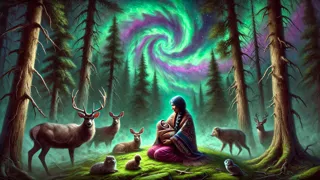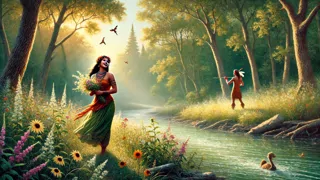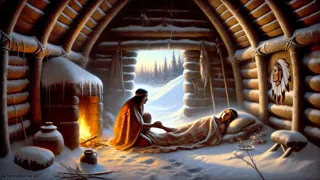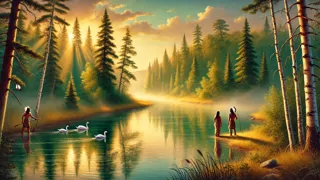Introduction
In the primeval hush of the North American forests, where the birch and pine stood sentry to lakes like mirrors and rivers that flowed like living poetry, the Ojibwe people told tales to warm their nights and teach their children. Among all these stories, none stirred the heart as much as the legend of Hiawatha—a hero born of nature, destined to guide his people, and marked by a love that would echo down generations. Hiawatha’s story begins before the memory of iron or the intrusion of distant strangers, in a world shaped by spirits and animals, where the wind itself was a messenger and every stone carried a song. The Ojibwe saw themselves as part of a vast living web: every fish, every bird, every leaf a relative, every season a sacred turning. It was in this world that Hiawatha was born, beneath the wavering lights of the aurora, to a mother who would soon be lost to him and a grandmother wise with the stories of the earth. Raised by Nokomis, his grandmother, Hiawatha grew into a youth blessed with curiosity and a spirit of peace. He listened to the whispers of the wind, learned the language of the animals, and dreamed of a world without war. Yet darkness lingered in those ancient woods—rivalries between tribes, hunger in the winter, and spirits whose intentions were not always kind. Guided by visions, Hiawatha set out not only to unite the scattered people but to bring harmony with the land itself. Along this journey, he would face daunting challenges: the fiery rage of the trickster spirit, Manabozho; the bitter feuds that threatened to tear villages apart; and the greatest trial of all, the call of love in the form of Minnehaha, the Laughing Water. Their meeting would change everything—uniting not just two hearts but two nations, and testing the very core of Hiawatha’s courage and compassion. This is the song of Hiawatha: a sweeping epic of adventure, love, and the enduring power of nature to heal and inspire.
The Birth of Hiawatha and the Call of the Forest
Long before the world was tamed by axes or mapped by strangers, the land of the Great Lakes was a realm of ancient spirits. The Ojibwe people made their homes along the lakeshores and deep within the endless woods, living in tune with the rhythms of the sun and moon. Into this world, a child was born beneath flickering northern lights—a child fated to bridge the realms of men and spirits.

Hiawatha’s mother, Wenonah, was beloved for her gentleness and her gift for song. One night, lured by the promise of a spirit’s love, she bore a son destined for greatness. Yet Wenonah’s joy was brief; her heart broke with sorrow, and she left the world as softly as she had sung her lullabies. The infant Hiawatha was entrusted to Nokomis, his wise and resilient grandmother. Nokomis raised him with patience and care, teaching him the language of the wind and the stories that lived in every leaf and stone.
Under Nokomis’s guidance, Hiawatha thrived. He ran with the deer, fished in the clear rivers, and watched the skies for messages from Thunderbird. As he grew, his strength became legend—he could paddle his canoe faster than the river’s current, hunt with uncanny skill, and speak to animals as easily as to people. But more than strength, he was marked by compassion. When other youths boasted of trophies or conquest, Hiawatha was quiet, helping elders with wood gathering or listening to the sick in their pain.
Yet shadows lurked among the trees. Tribes quarreled over hunting grounds, and hunger sometimes drove neighbors to anger. Old grievances simmered, threatening to ignite. One night, as Hiawatha sat by the fire, Nokomis spoke in a voice heavy with meaning: “Grandson, you are strong of arm and pure of heart, but the land aches for peace. The spirits have chosen you to heal what is broken.”
The words burned in Hiawatha’s heart. He retreated to a sacred grove where birches grew in a circle around an ancient stone. There he fasted and prayed for guidance. In a vision, he saw a bird with feathers like fire and eyes like stars, singing a song of unity. The bird spoke: “You must gather the warring nations. Teach them the wisdom of the forest, the patience of the river.”
Rising from his vigil, Hiawatha felt a new purpose. With Nokomis’s blessing, he set out to visit distant villages, carrying nothing but his bow, his flute, and the hope that peace could be more powerful than vengeance. His journey began beneath a sky of swirling auroras, his heart open to the lessons of the land and the possibilities that awaited him beyond the next bend in the river.
The Adventures of Hiawatha: Peace, Trials, and the Laughing Water
Hiawatha’s journey led him along winding trails and wide rivers, through lands wild and beautiful. Each village he entered greeted him first with suspicion—he was an outsider, a stranger carrying only his flute and a spirit of calm. Yet Hiawatha spoke not with boasts or threats but with gentle wisdom. He listened to elders, tended to children, and brought gifts of dried fish and stories from distant fires. Slowly, walls began to fall.

In the village of the Bear Clan, he witnessed a feud between brothers over a broken bow. Hiawatha knelt beside them, mending the bow with skillful hands and reminding them of the Bear’s strength: united, not divided. In another place, a famine threatened, and he taught the villagers how to find wild rice hidden in the marshes. His kindness became legend—soon, messengers traveled ahead of him, announcing that Hiawatha was coming, and villages prepared gifts and dances in his honor.
But not all were ready for peace. The trickster spirit Manabozho watched Hiawatha’s progress with jealousy and mischief. He sent storms that flattened crops, whispers that sowed doubt, and dreams that left chiefs restless. Hiawatha met these trials with patience and cleverness. When Manabozho sent a bitter winter, Hiawatha lured a lost sunbeam from its cave, bringing warmth back to the people. When envy kindled rage in young warriors, Hiawatha played his flute beneath the moon, its melody soothing even the most hardened hearts.
One evening, as the fireflies blinked along a willow-fringed stream, Hiawatha heard laughter like water over stones. He turned and saw her: Minnehaha, daughter of the neighboring Dakota chief. Her eyes sparkled with curiosity; her hair flowed dark as riverweed. She moved with grace, gathering wildflowers by the bank, her laughter lifting the dusk. Hiawatha felt the world pause. In that moment, a new chapter of his journey began.
Minnehaha was as clever as she was beautiful. She challenged Hiawatha with riddles and stories of her own people. Their love grew as naturally as spring follows snow—their walks along the river filled with laughter, their words as gentle as summer rain. Yet not all welcomed their union. Old wounds between Ojibwe and Dakota festered beneath the surface; some feared peace would cost them pride, others saw Minnehaha as a prize or a threat.
Together, Hiawatha and Minnehaha faced each trial. They negotiated truces between rival clans, built bridges of trade and song, and taught the young that the world was wide enough for many voices. As seasons turned, their love became a beacon—a promise that old hatreds could be healed, that rivers could join instead of divide. The Laughing Water had found her hero; Hiawatha, his destiny.
Storms of Sorrow: The Hard Winter and the Test of Love
Seasons changed as they always had: golden leaves drifted to earth, ice crept across ponds, and snow muffled the world. The land’s abundance faded to scarcity, and the Great Lakes groaned beneath their wintry armor. In this cold silence, hardship descended upon the villages.

A winter harsher than any in living memory seized the land. The winds howled from the north like hungry wolves. Snow piled high against the lodges, food stores dwindled, and each dawn brought new tales of struggle. Even the animals grew thin; even the fire seemed reluctant to burn. Yet in Hiawatha’s lodge, hope burned bright—a fire stoked not just by wood, but by love and shared purpose.
Minnehaha, now Hiawatha’s wife, cared for the sick and old, her laughter gentled by concern but never extinguished. She wove blankets from reeds, prepared birchbark medicines, and sang songs to banish the dark. Hiawatha led hunting parties farther than ever before, sometimes returning empty-handed but never despairing. He told stories to the children, weaving warmth from memory and courage.
But as the winter dragged on, sorrow crept in. The rivalry between Ojibwe and Dakota, never fully healed, began to flare again in the face of hunger. Old grievances returned with the cold. Some blamed Minnehaha, calling her an outsider. Others blamed Hiawatha for not ending the suffering by force.
In those longest nights, Minnehaha fell ill. A fever took hold, burning brighter than the fire. Hiawatha stayed by her side, his strong hands rendered helpless. He begged the spirits for mercy, offered gifts to the river and to Thunderbird, tried every remedy Nokomis could remember. But Minnehaha’s laughter grew faint—her eyes shone like winter stars, distant and fragile.
The people gathered in silence. The forest itself seemed to mourn. And then, one morning as the first thaw touched the river, Minnehaha slipped away like mist. Hiawatha wept—not just for his love, but for all the pain that winter had brought. Yet even in his grief, he remembered her teachings: kindness in adversity, hope in hardship. He rose from sorrow with a new resolve. As spring returned to the land, so did Hiawatha’s purpose—to honor Minnehaha’s memory by healing not just his own heart, but the hearts of his people.
He called a great council by the riverside. Chiefs from many nations gathered, their faces wary but open. Hiawatha spoke not of revenge or pride, but of shared loss and the promise of spring. “We are all children of this land,” he said. “Let us sow seeds of peace, so that our children may know laughter once more.” The council agreed, and a new peace was forged—one born not of conquest but of compassion, as enduring as the rivers and as hopeful as sunrise.
Conclusion
As seasons turned once more and the land bloomed beneath gentle rains, the spirit of Minnehaha lingered like a song on the breeze. Hiawatha walked the shores of the rivers they’d loved, his heart heavy but also alive with memory and hope. His story spread beyond his own people—becoming a tale told in every village, a lesson that courage was not only found in battle, but in forgiveness, compassion, and the healing of ancient wounds. The peace he forged became a living legacy. Children played where once warriors had fought, rivers flowed untroubled between villages now united by trade and friendship. And when storms gathered or winter threatened again, the people remembered Hiawatha’s wisdom: to face hardship together, to honor the land, and to keep hope burning bright even in the darkest hours. In time, Hiawatha grew old and returned to the spirit world. Some say he became a bird whose song is heard at sunrise; others believe he walks still beneath the pines. But all who listen closely to the wind or the rush of rivers can hear echoes of his story—a song of love, loss, and the enduring harmony between people and the land they call home.


















